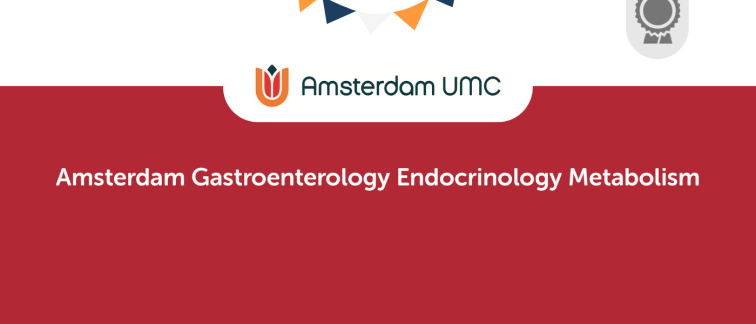AGEM-researcher, Dr. Mohammed Ghiboub has been awarded the prestigious Litwin IBD Pioneers grant from the Crohn’s & Colitis Foundation (USA). The grant supports innovative clinical and translational research projects with the potential to impact the treatment of IBD patients in the near future. The program encourages novel research into the diagnosis, identification of clinically relevant subsets, treatments, and potential cures for inflammatory bowel diseases (IBD). It funds innovative pilot research, allowing scientists to test their initial ideas and generate preliminary data. The project, titled Histone Serotonylation: The Hidden Epigenetic Key to Chronic Fatigue in Crohn’s Disease Patients in Remission, has been awarded $110,000 USD.
Mohammed is a postdoctoral researcher at the Tytgat Institute for Liver and Intestinal Research and the Department of Pediatric Surgery at Amsterdam UMC, where he started after obtaining my PhD from the University of Amsterdam in 2022. His research focuses on identifying novel metabolomic and epigenetic signatures as biomarkers and therapeutic targets in inflammatory bowel disease (IBD) and colorectal cancer. Through his work, he aims to advance precision medicine by uncovering molecular pathways that drive these diseases, ultimately contributing to improved diagnostics and treatment strategies.
 Mohammed Ghiboub, postdoctoral researcher at the Tytgat Institute for Liver and Intestinal Research and the Department of Pediatric Surgery at Amsterdam UMC
Mohammed Ghiboub, postdoctoral researcher at the Tytgat Institute for Liver and Intestinal Research and the Department of Pediatric Surgery at Amsterdam UMC
Persistent Fatigue in Crohn’s Disease: A Major Unmet Need
Fatigue is a debilitating yet often overlooked symptom of Crohn’s Disease (CD), affecting up to 70% of patients during active disease and persisting in 50% of those in remission (1,2). This profound exhaustion—unrelieved by rest—significantly impacts quality of life, yet remains poorly understood (1,2). The underlying mechanisms are complex, involving inflammation, metabolic changes, and psychological factors, but a clear molecular s or effective treatment is still lacking (1,2).
The Paradox of Serotonin in CD-Related Fatigue
Serotonin, a monoamine derived from dietary tryptophan, plays crucial roles in mood regulation, gut function, and immune response. While previous research has linked serotonin to fatigue in CD, data remain conflicting—some studies suggest low levels contribute to fatigue, while others indicate high levels play a role. This paradox stems from an incomplete understanding of serotonin’s function in both physiological and pathological processes (3).
Histone Serotonylation: A Paradigm Shift in Serotonin’s Role
The recent discovery of histone serotonylation—the covalent attachment of serotonin (Ser) to glutamine residues (Q5) on the histone H3 tail (H3Q5Ser)—has transformed our understanding of serotonin (4). No longer just a neurotransmitter, serotonin now emerges as a potential epigenetic regulator that may shape chromatin remodeling and gene expression.
Recent findings from Dr. Ghiboub’s research reveal that fatigued CD patients (both in remission and active disease) exhibit increased enrichment of H3Q5Ser in PBMCs. This suggests H3Q5Ser levels to be positively associated fatigue in CD and a promising target for therapeutic intervention.
 Figure 1. Attachment of serotonin to the glutamine residue at the fifth position of histone H3 by the epigenetic writer Transglutaminase 2 (TGM2) to form histone serotonylation (H3Q5ser).
Figure 1. Attachment of serotonin to the glutamine residue at the fifth position of histone H3 by the epigenetic writer Transglutaminase 2 (TGM2) to form histone serotonylation (H3Q5ser).
Key Research Questions
Supported by the Litwin IBD Pioneers grant, Dr. Ghiboub’s research employs cutting-edge techniques—including gene mutation analysis, CyTOF, ChIP-seq, ATAC-seq, and RNA-seq—to investigate two crucial questions: (i) Does persistent fatigue in quiescent CD correlate with sustained high levels of H3Q5Ser in PBMC chromatin? (ii) Does H3Q5Ser play a direct role in driving fatigue in CD? (Potential therapeutic target).
Outlook: A Potential Game-Changer for CD Research
This project has the potential to revolutionize our understanding of serotonin’s role in CD, particularly in fatigue pathophysiology. In the short term, it may lead to establish the association between H3Q5ser and debilitating fatigue IBD patients. In the long term, it could pave the way for novel therapeutic approaches, including drugs targeting histone serotonylation to combat chronic fatigue in CD.
This research not only holds promise for Crohn’s Disease but may also have broader implications for other fatigue-related disorders and epigenetic-driven conditions.
Other AGEM Reseracher involved in the project are Prof. Wouter de Jonge, Prof. Joep Derikx, Prof. Geert D'Haens, and Dr. Mark Löwenberg.
Sources
1. Nocerino A, Nguyen A, Agrawal M, Mone A, Lakhani K, Swaminath A. Fatigue in Inflammatory Bowel Diseases: Etiologies and Management. Adv Ther. 2020;37(1):97-112.
2. Villoria A, García V, Dosal A, Moreno L, Montserrat A, Figuerola A, et al. Fatigue in out-patients with inflammatory bowel disease: Prevalence and predictive factors. PLoS One. 2017;12(7):e0181435.
3. Truyens M, Lobatón T, Ferrante M, Bossuyt P, Vermeire S, Pouillon L, et al. Effect of 5- Hydroxytryptophan on Fatigue in Quiescent Inflammatory Bowel Disease: A Randomized Controlled Trial. Gastroenterology. 2022;163(5):1294-305.e3.
4. Farrelly LA, Thompson RE, Zhao S, Lepack AE, Lyu Y, Bhanu NV, Zhang B, et al. Histone serotonylation is a permissive modification that enhances TFIID binding to H3K4me3. Nature. 2019 Mar;567(7749):535-539. doi: 10.1038/s41586-019-1024-7. Epub 2019 Mar 13. PMID: 30867594; PMCID: PMC6557285.

